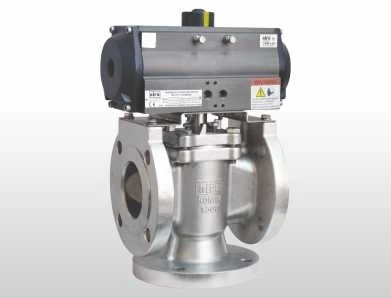Efficiency Unleashed: The Ultimate Guide to Plug Valves" is a comprehensive resource that explores the versatility and effectiveness of plug valves in various industries. This guide delves into plug valves' mechanics, applications, and advantages, offering readers valuable insights into how they can optimize fluid control and sealing processes. Whether you're a seasoned professional or a newcomer to the field, this guide equips you with the knowledge needed to make informed decisions and improve operational efficiency. Discover the power of plug valve and their role in enhancing precision, reliability, and performance across different applications.
Mastering the Basics: Understanding Plug Valve Mechanics
Plug valves are essential components in many industrial processes, providing precise control over fluid flow. To harness their full potential, it's crucial to grasp the fundamentals of plug valve mechanics.
At its core, a plug valve is a quarter-turn valve with a cylindrical or tapered plug that can be rotated within the valve body to control the flow of fluids. Understanding its key components and operation is essential.
The valve body, typically made of various materials such as cast iron, stainless steel, or plastics, houses the plug and serves as the conduit for fluid flow. The plug, often tapered or cylindrical in shape, is the central element responsible for regulating flow. When the plug is fully open, it allows for unobstructed flow, and when closed, it creates a tight seal.
Actuation methods vary, with manual, pneumatic, hydraulic, or electric options available. Manual plug valves are operated by turning a handwheel, while automated versions rely on external mechanisms like motors or compressed air.
Plug Valves in Action: Real-world Applications
Plug valves find application in a wide array of industries due to their versatility and reliable performance. Here are some real-world applications where plug valves shine:
Oil and Gas: In the oil and gas sector, plug valves are crucial for controlling the flow of crude oil, natural gas, and various petrochemical products. Their ability to handle abrasive and corrosive media makes them a preferred choice.
Chemical Processing: Plug valves are commonly used in chemical plants to regulate the flow of aggressive chemicals and hazardous substances safely.
Water and Wastewater Treatment: Municipal water treatment facilities utilize plug valves for managing the flow of water and chemicals involved in purification and distribution processes.
Power Generation: Plug valves play a vital role in power plants by controlling the flow of steam, cooling water, and other fluids required for electricity generation.
Marine Industry: In shipbuilding and maritime applications, plug valves are used for ballast control, fuel transfer, and other critical functions.
Food and Beverage: The food industry relies on sanitary plug valves for precise control in processes such as food production and bottling.
Unlocking Efficiency: Tips and Tricks for Optimal Performance
To ensure plug valves deliver optimal performance, consider these tips and tricks:
Proper Maintenance: Regular inspection and maintenance are essential. Lubricate moving parts, replace worn seals, and address any signs of corrosion or damage promptly.
Correct Installation: Ensure that plug valves are installed correctly, following manufacturer guidelines. Proper alignment and torque settings are crucial for effective sealing.
Choosing the Right Material: Select plug valves with materials suitable for the specific application. Different materials offer varying degrees of corrosion resistance, temperature tolerance, and chemical compatibility.
Avoid Over-Tightening: When closing the valve, avoid excessive force as it may damage the plug and result in leaks.
Actuation System Maintenance: If using automated plug valves, regularly check and maintain the actuation system, including motors, gears, and controls.
Sealing the Deal: How Plug Valves Ensure Tight Closure
One of the primary functions of plug valves is to create a tight seal to prevent fluid leakage. This sealing capability is crucial for safety and operational efficiency.
The seal is achieved through the interaction of the plug and the valve body. When the plug is rotated into the closed position, it fits snugly into a tapered or cylindrical seat within the valve body, effectively blocking the flow of fluid. The tight contact between the plug and the seat ensures minimal leakage.
Sealing materials such as elastomers, PTFE, or metal-to-metal surfaces are used to enhance the seal's integrity. The choice of sealing material depends on the type of fluids being handled and the operating conditions.
Comparing Plug Valves: Choosing the Right Option for Your Needs
When selecting a plug valve, it's essential to consider various factors to ensure it meets your specific requirements. Here are some key aspects to compare:
Size and Pressure Rating: Determine the required valve size and pressure rating based on your application's flow rate and pressure conditions.
Material Compatibility: Consider the compatibility of the valve materials with the fluids being handled. Different materials offer varying levels of resistance to corrosion and erosion.
Actuation Method: Decide whether you need manual or automated plug valves based on your control preferences and operational demands.
Temperature Range: Ensure that the selected valve can operate within the temperature range of your application without compromising performance.
Maintenance Requirements: Assess the maintenance needs and availability of spare parts for the chosen plug valve, as this can impact long-term costs.
By understanding plug valve mechanics, their real-world applications, tips for optimal performance, sealing capabilities, and factors for comparison, you can make informed decisions to maximize the efficiency and reliability of your fluid control processes. Aira Euromations' plug valve is a reliable and versatile fluid control solution. Crafted with precision, it excels in regulating the flow of various liquids and gases across industries. Known for its robust construction and tight sealing capabilities, this plug valve ensures efficiency and safety in critical applications. Trust us for dependable flow control solutions.


